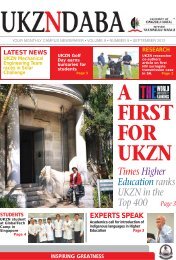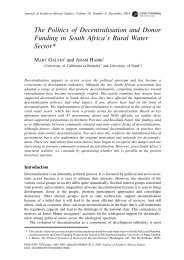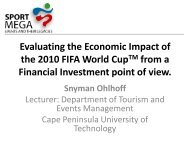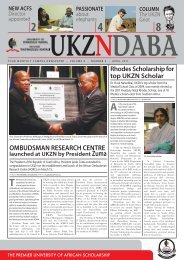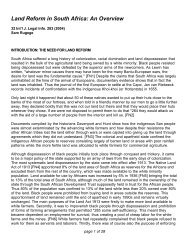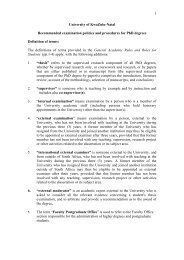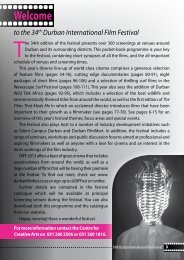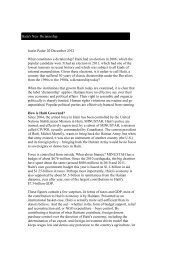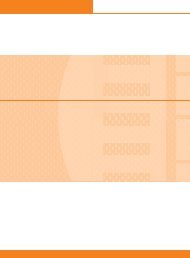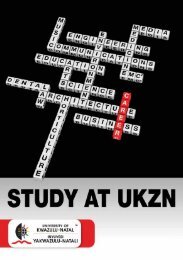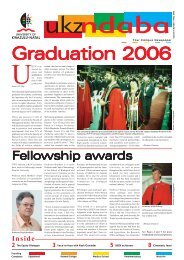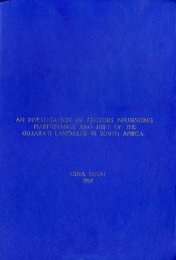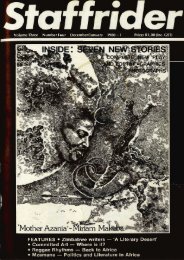Staffrider Vol.6 No.2 1985 - DISA
Staffrider Vol.6 No.2 1985 - DISA
Staffrider Vol.6 No.2 1985 - DISA
Create successful ePaper yourself
Turn your PDF publications into a flip-book with our unique Google optimized e-Paper software.
is now in Luzira Upper Prison, near Kampala. His detentionmay be connected with an article in Munnansi on 21 Novemberwhich criticised the presence of North Korean troops inUganda. Two Munnansi journalists — Andrew Mulindwa andJohn Baptist Kyeyune — were arrested on 2 November andheld at various places. Mulindwa was transferred to JinjaRoad police station in Kampala on or about 20 November;Kyeyune to Kampala central police station on or about23 November, where he is reported to have been tortured.Another Munnansi journalist, David Kasujja, was arrested atEntebbe Road airport on 31 October, released on bail,rearrested and served with a detention order; he is believedto be held in Luzira Upper Prison.The Uganda Pilot, also a weekly English-language paper,has a large Roman Catholic readership. Two of its journalists— Sam Kiwanuka and Francis Kanyeihamba — were arrestedin early April after the Pilot published a story criticising andsatirising the government's proposed Women's Charter. InMay they were charged with 'writing and publishing a falseand malicious publication intended to incite the public' andheld in custody until November, when they appeared incourt. Although acquitted, they were immediately rearrestedand served with detention orders; they are believed to beheld in Luzira Upper Prison.The Star is Uganda's only non-government Englishlanguagedaily. Its editor-in-chief, Drake Ssekkeba, and chiefsub-editor, Sam Katwere, were arrested on 8 November afterthe paper published a front-page story accusing governmentministers of being corrupt. They too are reportedly in LuziraUpper Prison.SOUTH AFRICA: WRITER RANTETE DETAINEDJohannes Rantete, 20-year-old author of The ThirdDay of September — an eye-witness account of theSebokeng unrest — was detained under Section 29 ofthe Internal Security Act 1982 on 23 November 1984until his release in mid-December.Sebokeng is one of three townships 60 kilometres south ofJohannesburg in which black demonstrations first erupted inlate August. The demonstrations called for a one-day boycottof work and schools to protest against rent increases andinferior education, and sparked off widespread unrest when,on 2 September, South Africa's new constitution came intoforce, providing for limited Indian and 'coloured'representation but excluding the black majority in a tri-racialparliament. Large numbers of police were mobilised, usingrubber bullets and live ammunition to break updemonstrations and gatherings. On 2 3 October, Sebokengwas the scene of an intensive security operation in which —what is seen as a new stage of repression — the army joinedthe police in a house-to-house search, ostensibly forinstigators of the unrest which had continued since earlySeptember.Johannes Rantete, a resident of Sebokeng, wrote aneye-witness account of the events of 3 September, and took areel of colour photographs, mostly of buildings and vehiclesdestroyed. He sent both to Ravan Press, who published theaccount, illustrated by black-and-white sketches based on thephotographs, as the first in the new Ravan Storyteller series,in late October. On 23 November, security policemen arrestedRantete, and then visited Ravan Press, demanding hisphotographs. But because of their documentary interest,Ravan Press had posted the photographs to another of theirauthors, who is currently working on an illustrated history ofSouth Africa since 1976. The photographs never reachedtheir destination. In a telephone conversation with thepublishers, a Captain Kruger of the Security Police statedthat until the photographs were recovered, the interrogationof the author could not begin.The book was formally banned by the Directorate ofPublications, but on appeal from Ravan the ban was laterlifted.In his book Rantete writes: 'As a resident of SebokengI was also concerned by the events that were to take place,but was hindered by my parents to remain within the yard.In all my born days I had never found myself amidst astriking crowd, and thus the hindrance laid on me by myparents was as painful as the heart of a divorced man. Imultiplied two by two to get an easy outlet from the yard.Thus, by doing so, I secured my curiosity which is the firstthing a newsman should have.' It was, it seems, his 'newsman'scuriosity' which led to his detention.SAUDI ARABIA: THREAT TO FREEDOM OF EDUCATIONSaudi authorities have issued an order requiring thestate to review all research undertaken by its nationalsstudying abroad for doctorates or masters degrees. Thisinfringement of academic freedom has implicationsworldwidas most of those affected conduct theirresearch outside Saudi Arabia.The National Security Council of Saudi Arabia (equivalentto the FBI in the USA), headed by the Interior Minister,Prince Naif Bin Abd al-Aziz, issued an order in October1984 instructing presidents of universities as well aseducational attaches at Saudi embassies abroad, to make itobligatory for Saudi students studying for their masters anddoctorate degrees to submit a copy of their thesis/dissertationto the National Security Council in Saudi Arabiabefore handing it to the university. The Council may approveor reject any research submitted for its inspection. Arejection means that the student cannot then submit hiswork to his university.It is believed that the order is meant to discouragestudents from researching sensitive political or social issues.Previously, doctorate research undertaken by Saudis inforeign universities was being banned from entering SaudiArabia despite the fact that the researchers held prominentpositions in Saudi Arabia. Students were required to delivera copy of their graduate research project to the educationalattaches at the local Saudi embassy after graduation.Embassies reported any irregularities in the research at theirown discretion.The order of the National Security Council is a seriousinfringement of academic freedom, not only in Saudi Arabiabut all over the world. There are some 15,00 Saudi studentsstudying abroad at institutions of higher learning worldwide,most of them in the United States and the United Kingdom.INDEX is published by courtesy of Index on CensorshipJ~ast MidnightIt's way past midnight and I am tryingTo get some sleep. The roomSmells drunk. The bed reeks ofSour body odours. I can hear you breathe.It's way past midnight and the dark roomIs a cage hurtling through spaceTowards daybreak. I feel your lipsWhispering close to my toothless mouth:It's way past midnight and I want to feelYou over and inside meBefore the cock crow of the compound siren.Sp•?Hp-^SBEI^r^mSkBES1 ^HP*bgfSTAFFRIDER, VOL. 6 NO. 2, <strong>1985</strong>



